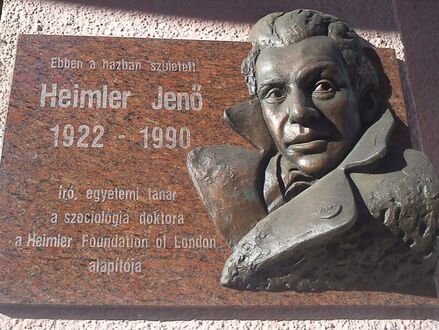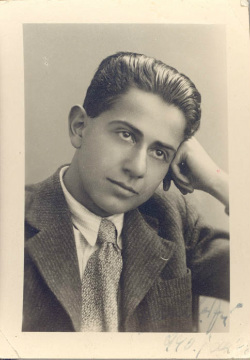
Eugene Heimler
A True Jewish Hero of the 20th Century
survived Auschwitz and other concentration camps.
After the Holocaust he became a world-renown writer and founder of a new healing approach to life, which emphasizes overcoming obstacles, - transforming pain into creativity.
His books will change the way you view your life and give you hope.
In 2013 a memorial plaque was put up on the house of 11, Kings Street , where the family had lived, commemorating Heimler Jenö.
|
|
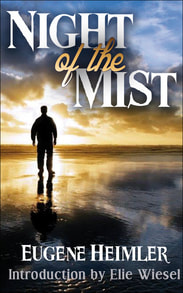
Night of the Mist
is an account of a young man’s experience under the Gestapo. It records the day-to-day events, the miserable conditions of existence, the physical suffering endured by the prisoners. But Eugene Heimler goes beyond a factual record of events. With a gifted insight he describes the deeper effects of suffering – on their minds and souls. He writes not only of himself but of many others imprisoned with him: of the doctor and the architect, no longer middle-class gentlemen of authority, but near animals; of the girl, once gentle and intelligent, now offering her diseased body for a crust of bread; of the man who spent twelve years in prison for the murder of his wife, and who in the inferno of a concentration camp found meaning in life.
Even though he knew the worst of humanity, Heimler was able to regain his faith in God and in the dignity of man. He does not hate; and the horror of his experience is transcended by his compassion and deep understanding of spiritual values. The true message of his book is not one of horror, but of hope.
Available from: Amazon.com
is an account of a young man’s experience under the Gestapo. It records the day-to-day events, the miserable conditions of existence, the physical suffering endured by the prisoners. But Eugene Heimler goes beyond a factual record of events. With a gifted insight he describes the deeper effects of suffering – on their minds and souls. He writes not only of himself but of many others imprisoned with him: of the doctor and the architect, no longer middle-class gentlemen of authority, but near animals; of the girl, once gentle and intelligent, now offering her diseased body for a crust of bread; of the man who spent twelve years in prison for the murder of his wife, and who in the inferno of a concentration camp found meaning in life.
Even though he knew the worst of humanity, Heimler was able to regain his faith in God and in the dignity of man. He does not hate; and the horror of his experience is transcended by his compassion and deep understanding of spiritual values. The true message of his book is not one of horror, but of hope.
Available from: Amazon.com
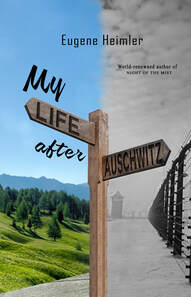
In this book, "MY LIFE AFTER AUSCHWITZ" (also titled "A Link in the Chain"), Eugene Heimler describes his eventful return journey from Auschwitz to his home in Hungary and how he reshaped his life since the end of the war.
Heimler tells his stories poetically and vividly:
He travels towards home on a buffer of a train, next to a German SS man who could easily push him off;
He witnesses the rape of Kati, his travel companion by Russian brutes, with their machine guns aimed at him;
Returning to Hungary, at the age of 23, he soon realizes that as a Jew he is still not wanted in his native country.
The Red Army occupies Hungary and makes attempts on his life;
He works as a journalist in the Social Democratic Headquarters and is arrested and charged with treason for an article he wrote; shots are aimed at him.
When the Right Wing Smallholders win the Hungarian election in 1945, he contemplates leaving Hungary.
An invitation to spy for the Communists in return for getting his poems published gets him into a momentary trap, but he outwits “Uncle Zoltan”, his conspirator who unwittingly provides him with the Russian exit visa he needs in order to go to London ‘for a short visit’.
In 1947 he travels to England. His newly married wife, Lily, follows him later.
When in 1949 the Secret Police torture his friends in Budapest, Heimler breaks down, as now all hope is lost for ever returning to his native homeland.
His trials in England are manifold. Without speaking English, the couple lives on fear and tears. When Heimler arrives in England he is, mentally, still a very sick man. He describes the psychoanalytic treatment which he undergoes at that time.
After years of hardship and struggle he qualifies as a psychiatric social worker in 1953. He becomes County Psychiatric Social Work Organizer for the Middlesex County Council, and his experimental work made him one of the pioneers of ‘community mental health’ in England.
His interviews with patients in pubs and parks have been the subject of much controversy.
Heimler goes on to show not only how he affects his patients but also how they affect him, and how he grows through and with them.
His account, in the latter part of the book, of the ‘Hendon Experiment’, in which he works hand in hand with the National Assistance Board in an attempt to solve the problem of the ‘work-shy’, and of his experiment in mental health with a General Practitioner, will be of particular interest to doctors, social workers and all who are concerned with the care of the mentally ill.
Available from Amazon.com My Life After Auschwitz
Heimler tells his stories poetically and vividly:
He travels towards home on a buffer of a train, next to a German SS man who could easily push him off;
He witnesses the rape of Kati, his travel companion by Russian brutes, with their machine guns aimed at him;
Returning to Hungary, at the age of 23, he soon realizes that as a Jew he is still not wanted in his native country.
The Red Army occupies Hungary and makes attempts on his life;
He works as a journalist in the Social Democratic Headquarters and is arrested and charged with treason for an article he wrote; shots are aimed at him.
When the Right Wing Smallholders win the Hungarian election in 1945, he contemplates leaving Hungary.
An invitation to spy for the Communists in return for getting his poems published gets him into a momentary trap, but he outwits “Uncle Zoltan”, his conspirator who unwittingly provides him with the Russian exit visa he needs in order to go to London ‘for a short visit’.
In 1947 he travels to England. His newly married wife, Lily, follows him later.
When in 1949 the Secret Police torture his friends in Budapest, Heimler breaks down, as now all hope is lost for ever returning to his native homeland.
His trials in England are manifold. Without speaking English, the couple lives on fear and tears. When Heimler arrives in England he is, mentally, still a very sick man. He describes the psychoanalytic treatment which he undergoes at that time.
After years of hardship and struggle he qualifies as a psychiatric social worker in 1953. He becomes County Psychiatric Social Work Organizer for the Middlesex County Council, and his experimental work made him one of the pioneers of ‘community mental health’ in England.
His interviews with patients in pubs and parks have been the subject of much controversy.
Heimler goes on to show not only how he affects his patients but also how they affect him, and how he grows through and with them.
His account, in the latter part of the book, of the ‘Hendon Experiment’, in which he works hand in hand with the National Assistance Board in an attempt to solve the problem of the ‘work-shy’, and of his experiment in mental health with a General Practitioner, will be of particular interest to doctors, social workers and all who are concerned with the care of the mentally ill.
Available from Amazon.com My Life After Auschwitz
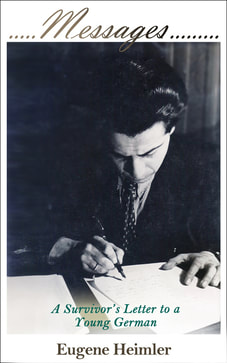
Messages
- A Survivor's Letter to a Young German -
This book is about the author’s journey of losing, searching and re-finding his own identity and place in his physical, emotional and spiritual worlds.
In his ‘stream of consciousness' musings Heimler crosses time from biblical through medieval to modern human experiences of transformation through pain to self-discovery.
This artful intimate intertwining of personal, particular and universal themes draws the reader into Heimler’s awe-inspiring multi-layered world of courageous introspection.
Messages illuminates how Heimler, as a Holocaust survivor, struggles to re-discover meaning, purpose and passion from his once shattered world.
Working through these challenges leads him to existential questions about the very meaning of life:
What are the connections between life and what we call death?
How can meaning transcend suffering?
How can we find peace if we deny our worst hours?
How can we understand all the hatred that surrounds us?
How can hate be turned into creativity instead of self-destructiveness?
What can keep our love and our ability to love alive in the midst of atrocities or indifference?
Eugene Heimler compassionately begins to heal the rift between Judaism and Christianity caused by the holocaust and previous persecutions of Jews.
Come, join this remarkable man in his quest for eternal wisdom!
Available from Amazon.com
- A Survivor's Letter to a Young German -
This book is about the author’s journey of losing, searching and re-finding his own identity and place in his physical, emotional and spiritual worlds.
In his ‘stream of consciousness' musings Heimler crosses time from biblical through medieval to modern human experiences of transformation through pain to self-discovery.
This artful intimate intertwining of personal, particular and universal themes draws the reader into Heimler’s awe-inspiring multi-layered world of courageous introspection.
Messages illuminates how Heimler, as a Holocaust survivor, struggles to re-discover meaning, purpose and passion from his once shattered world.
Working through these challenges leads him to existential questions about the very meaning of life:
What are the connections between life and what we call death?
How can meaning transcend suffering?
How can we find peace if we deny our worst hours?
How can we understand all the hatred that surrounds us?
How can hate be turned into creativity instead of self-destructiveness?
What can keep our love and our ability to love alive in the midst of atrocities or indifference?
Eugene Heimler compassionately begins to heal the rift between Judaism and Christianity caused by the holocaust and previous persecutions of Jews.
Come, join this remarkable man in his quest for eternal wisdom!
Available from Amazon.com
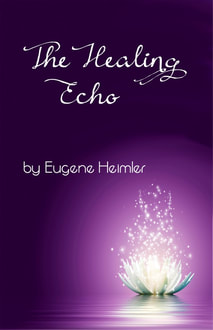
The Healing Echo
When Dr. Sigmund Freud’s concepts and ideas penetrated Eugene Heimler’s young Hungarian mind, the earth began spinning faster and lightening crossed the Western sky.
Two ingenious minds were crossing up there in the heights; both listened with respect – and then went their opposite ways: one to analysis, and the other to synthesis.
Eugene Heimler’s pioneering philosophy, that our potential lies in the creative transformation of our negative forces, is as new a thinking in our 21st century as it was in the 1950s when it first broke ground. Heimler’s radical idea that we need to harness frustration in order to flourish crossed the worlds of the post-industrial revolution and unemployment to our current age in which people search for the elusive meaningfulness of life.
The author had a ‘paradoxical’ title ready for his book: “The Gift of Unemployment”, however, there was fear that hopeless ‘victims’ of unemployment would smash the shop-windows of book-sellers in Great Britain.
Yet, he, as well as those men and women whom he helped find meaning and purpose in their often shattered lives, were convinced, that his method works.
Not only people who are stagnated in their growth, but also children in kindergartens and schools can, with the help of Heimler’s new approach, explore their untapped potential.
By listening to our inner selves, we can hear our echo, our echo that heals us and that helps us to live a fuller and happier life, to survive and thrive in our complex society. Eugene Heimler first echoed these thoughts in his ground-breaking book “Survival in Society”.
Now, by immersing yourself in The Healing Echo, you have an opportunity to enter this hopeful world of yet unimagined possibilities.
Available from Amazon.com
When Dr. Sigmund Freud’s concepts and ideas penetrated Eugene Heimler’s young Hungarian mind, the earth began spinning faster and lightening crossed the Western sky.
Two ingenious minds were crossing up there in the heights; both listened with respect – and then went their opposite ways: one to analysis, and the other to synthesis.
Eugene Heimler’s pioneering philosophy, that our potential lies in the creative transformation of our negative forces, is as new a thinking in our 21st century as it was in the 1950s when it first broke ground. Heimler’s radical idea that we need to harness frustration in order to flourish crossed the worlds of the post-industrial revolution and unemployment to our current age in which people search for the elusive meaningfulness of life.
The author had a ‘paradoxical’ title ready for his book: “The Gift of Unemployment”, however, there was fear that hopeless ‘victims’ of unemployment would smash the shop-windows of book-sellers in Great Britain.
Yet, he, as well as those men and women whom he helped find meaning and purpose in their often shattered lives, were convinced, that his method works.
Not only people who are stagnated in their growth, but also children in kindergartens and schools can, with the help of Heimler’s new approach, explore their untapped potential.
By listening to our inner selves, we can hear our echo, our echo that heals us and that helps us to live a fuller and happier life, to survive and thrive in our complex society. Eugene Heimler first echoed these thoughts in his ground-breaking book “Survival in Society”.
Now, by immersing yourself in The Healing Echo, you have an opportunity to enter this hopeful world of yet unimagined possibilities.
Available from Amazon.com
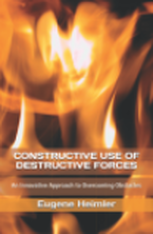
CONSTRUCTIVE USE OF DESTRUCTIVE FORCES
-An Innovative Approach to Overcoming Obstacles-
(Also titled "Survival in Society")
Can one benefit from suffering, pain and frustration? Prof. Dr. Eugene Heimler claims that that, what we experience as frustration, is our potential for satisfaction. Based on his method of Social Functioning we can transform our weakness and what we call ‘negative’ into strength and to our own satisfaction as well as to the benefit of society. A certain amount of frustration serves as a driving force in our lives, that we need in order to be creative.
In this book, using case studies, Heimler describes how we can create a balance of satisfaction and frustration by means of the use of his method of Social Functioning and of the Heimler Scale, by observing and listening to ourselves.
Eugene Heimler’s self-help-method of Social Functioning was developed and tested and proved extraordinarily successful.
In CONSTRUCTIVE USE OF DESTRUCTIVE FORCES Heimler describes in detail his interviewing- and therapy technique with individuals, couples and groups. His goal is to help them use their inner resources and past experiences.
The Heimler Method is applied with those needing therapy as well as ‘healthy’ individuals who want to explore their unused potential; it is used by teachers to help students become more creative; in the relationship between employers and employees; as well as by social workers and other helping professions.
Available from Amazon.com
-An Innovative Approach to Overcoming Obstacles-
(Also titled "Survival in Society")
Can one benefit from suffering, pain and frustration? Prof. Dr. Eugene Heimler claims that that, what we experience as frustration, is our potential for satisfaction. Based on his method of Social Functioning we can transform our weakness and what we call ‘negative’ into strength and to our own satisfaction as well as to the benefit of society. A certain amount of frustration serves as a driving force in our lives, that we need in order to be creative.
In this book, using case studies, Heimler describes how we can create a balance of satisfaction and frustration by means of the use of his method of Social Functioning and of the Heimler Scale, by observing and listening to ourselves.
Eugene Heimler’s self-help-method of Social Functioning was developed and tested and proved extraordinarily successful.
In CONSTRUCTIVE USE OF DESTRUCTIVE FORCES Heimler describes in detail his interviewing- and therapy technique with individuals, couples and groups. His goal is to help them use their inner resources and past experiences.
The Heimler Method is applied with those needing therapy as well as ‘healthy’ individuals who want to explore their unused potential; it is used by teachers to help students become more creative; in the relationship between employers and employees; as well as by social workers and other helping professions.
Available from Amazon.com
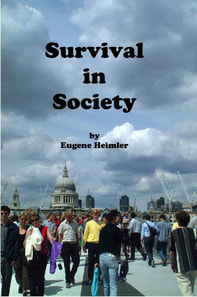
Survival in Society
Can one benefit from suffering, pain and frustration? Prof. Dr. Eugene Heimler claims that that, what we experience as frustration, is our potential for satisfaction. Based on his method of Social Functioning we can transform our weakness and what we call ‘negative’ into strength and to our own satisfaction as well as to the benefit of society. A certain amount of frustration serves as a driving force in our lives, that we need in order to be creative.
In this book, using case studies, Heimler describes how we can create a balance of satisfaction and frustration by means of the use of his method of Social Functioning and of the Heimler Scale, by observing and listening to ourselves.
Eugene Heimler’s self-help-method of Social Functioning was developed and tested and proved extraordinarily successful.
In Survival in Society Heimler describes in detail his interviewing- and therapy technique with individuals, couples and groups. His goal is to help them use their inner resources and past experiences.
The Heimler Method is applied with those needing therapy as well as ‘healthy’ individuals who want to explore their unused potential; it is used by teachers to help students become more creative; in the relationship between employers and employees; as well as by social workers and other helping professions.
Available from Amazon.com
Can one benefit from suffering, pain and frustration? Prof. Dr. Eugene Heimler claims that that, what we experience as frustration, is our potential for satisfaction. Based on his method of Social Functioning we can transform our weakness and what we call ‘negative’ into strength and to our own satisfaction as well as to the benefit of society. A certain amount of frustration serves as a driving force in our lives, that we need in order to be creative.
In this book, using case studies, Heimler describes how we can create a balance of satisfaction and frustration by means of the use of his method of Social Functioning and of the Heimler Scale, by observing and listening to ourselves.
Eugene Heimler’s self-help-method of Social Functioning was developed and tested and proved extraordinarily successful.
In Survival in Society Heimler describes in detail his interviewing- and therapy technique with individuals, couples and groups. His goal is to help them use their inner resources and past experiences.
The Heimler Method is applied with those needing therapy as well as ‘healthy’ individuals who want to explore their unused potential; it is used by teachers to help students become more creative; in the relationship between employers and employees; as well as by social workers and other helping professions.
Available from Amazon.com
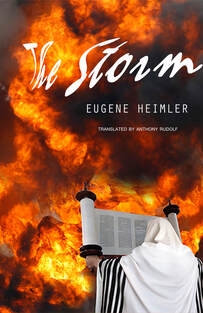
Dr. Eugene Heimler’s “THE STORM” is a powerful drama in verse that reveals the secret of the survival of the Jewish people and how the Jews have been able to overcome history’s never-ending challenges.
The drama is rooted in the author’s personal Nazi death-camp experiences and his ongoing meditation on the Jewish tragedy of Masada. Despite a history punctuated by atrocities, Heimler breathes hope into the future for Jews, by voicing God’s affirmation of the eternity of their survival.
The timeless message of Dr. Heimler's deeply moving drama is needed now more than ever before, to penetrate souls and educate minds.
Available from: Amazon.com The Storm
The drama is rooted in the author’s personal Nazi death-camp experiences and his ongoing meditation on the Jewish tragedy of Masada. Despite a history punctuated by atrocities, Heimler breathes hope into the future for Jews, by voicing God’s affirmation of the eternity of their survival.
The timeless message of Dr. Heimler's deeply moving drama is needed now more than ever before, to penetrate souls and educate minds.
Available from: Amazon.com The Storm
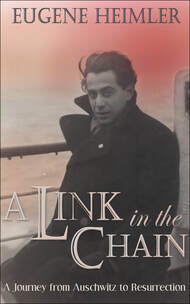
A Link in the Chain
- A Journey from Auschwitz to Resurrection -
(also under the title "My Life After Auschwitz)
In this second powerfully written volume of Eugene Heimler’s incredible life’s journey from persecuted Jewish child in a small town in Hungary to world-renowned writer, therapist and teacher, Heimler is on his way home to Hungary from the concentration camps of Germany, where he had lost all his family. On this journey he experiences many life-threatening moments: being on a train with a former German SS man; witnessing the brutal rape of his traveling companion by Russian thugs; attempts on his life and being arrested and charged with treason in Hungary.
Eventually he reaches England and remarries, but his trials are manifold. After hearing that the Secret Police are torturing his friends in Budapest, he realizes he can never return to Hungary and has a breakdown. When a psycho-analysis helps him come back to life and regain his hope for the future, he is ready to act on an early ambition to become a writer and psychologist. He starts to write NIGHT OF THE MIST, which has become a world classic, and becomes a Psychiatric Social Worker. These challenges have their obstacles as well, and Heimler vividly describes his work as a Psychiatric Social Worker, including his refusal to give up on others—and himself. His experiences eventually lead to the development of a new method of therapy, which is today known as the Heimler Method of Social Functioning.
Throughout his life, Heimler consistently fought to help victims gain the courage to become victors. In A LINK IN THE CHAIN he once more tells his stories poetically and vividly.
Available from Amazon.com
- A Journey from Auschwitz to Resurrection -
(also under the title "My Life After Auschwitz)
In this second powerfully written volume of Eugene Heimler’s incredible life’s journey from persecuted Jewish child in a small town in Hungary to world-renowned writer, therapist and teacher, Heimler is on his way home to Hungary from the concentration camps of Germany, where he had lost all his family. On this journey he experiences many life-threatening moments: being on a train with a former German SS man; witnessing the brutal rape of his traveling companion by Russian thugs; attempts on his life and being arrested and charged with treason in Hungary.
Eventually he reaches England and remarries, but his trials are manifold. After hearing that the Secret Police are torturing his friends in Budapest, he realizes he can never return to Hungary and has a breakdown. When a psycho-analysis helps him come back to life and regain his hope for the future, he is ready to act on an early ambition to become a writer and psychologist. He starts to write NIGHT OF THE MIST, which has become a world classic, and becomes a Psychiatric Social Worker. These challenges have their obstacles as well, and Heimler vividly describes his work as a Psychiatric Social Worker, including his refusal to give up on others—and himself. His experiences eventually lead to the development of a new method of therapy, which is today known as the Heimler Method of Social Functioning.
Throughout his life, Heimler consistently fought to help victims gain the courage to become victors. In A LINK IN THE CHAIN he once more tells his stories poetically and vividly.
Available from Amazon.com
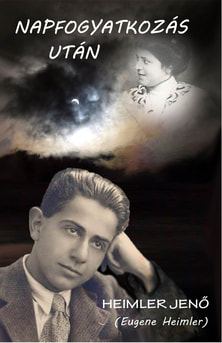
"NAPFOGYATKOZÁS UTÁN” is a publication of early poetry in Hungarian. It is a tribute to Eugene Heimler, whose poems had first been published weekly in newspapers in Szombathely when he was seventeen and were published under his pen-name “Vát Jenö” in three separate volumes between 1939 and 1946.
Heimler defied his professors of Hungarian literature, who, about the time he wrote and published his poems failed him in Hungarian literature because he was a Jew and because of his revolutionary ideas. These men were fascists! The publisher, who after initial assistance terminated his contract, practically threw him out into the streets without any livelihood.
Antisemitism was very much alive and growing in Hungary.
How does one become a poet?
In his book “My Life After Auschwitz” Eugene Heimler writes:
“…My mother wanted me to become a poet when I was a child. I sat on her lap one winter evening, and she told me that this was her secret wish …”
“…When I was nine years old, and mother was lying in bed with the illness that killed her in the end … I was frightened that she might die, … and sat down to write the first poem of my life… It was about a just king of Hungary, King Matthias. I waited until she woke, then I sat on her bed and read it to her. ‘It’s beautiful, Jancsi … You are a poet all right …’”
“… When I was fourteen years old, I sat one winter night alone in my little room while doctors fought for mother’s life … and … I sat down then and wrote a poem for her. …While I wrote, my tears fell on the ink … the past was gone, and the good old days … and mother might die … tonight … tomorrow … or in a year’s time? Before the specialist came next day …, I read this poem to her, and said: ‘You promised me once that you would recite my poems one day …’ And to my father’s surprise, she sat up in bed with tears in her eyes and recited the poem to us. I knew then that I should have to write, write a lot, to make her well. But she died when I was seventeen.”
“… She was so happy when I wrote something. Ever since she died I always feel her presence when I have the pen in my hand.”
“… I was so much attached to her, that I have been living a long secret winter night with her … I have lived with her night and day, sitting in her lap long after she died.”
In 2013 a memorial plaque was put up on the house of 11, Kings Street , where the family had lived, commemorating Heimler Jenö.
I am re-publishing these poems for present and future generations to make Eugene Heimler’s poetry eternal and to preserve his legacy forever.
Available from: Amazon.com
Home
Heimler defied his professors of Hungarian literature, who, about the time he wrote and published his poems failed him in Hungarian literature because he was a Jew and because of his revolutionary ideas. These men were fascists! The publisher, who after initial assistance terminated his contract, practically threw him out into the streets without any livelihood.
Antisemitism was very much alive and growing in Hungary.
How does one become a poet?
In his book “My Life After Auschwitz” Eugene Heimler writes:
“…My mother wanted me to become a poet when I was a child. I sat on her lap one winter evening, and she told me that this was her secret wish …”
“…When I was nine years old, and mother was lying in bed with the illness that killed her in the end … I was frightened that she might die, … and sat down to write the first poem of my life… It was about a just king of Hungary, King Matthias. I waited until she woke, then I sat on her bed and read it to her. ‘It’s beautiful, Jancsi … You are a poet all right …’”
“… When I was fourteen years old, I sat one winter night alone in my little room while doctors fought for mother’s life … and … I sat down then and wrote a poem for her. …While I wrote, my tears fell on the ink … the past was gone, and the good old days … and mother might die … tonight … tomorrow … or in a year’s time? Before the specialist came next day …, I read this poem to her, and said: ‘You promised me once that you would recite my poems one day …’ And to my father’s surprise, she sat up in bed with tears in her eyes and recited the poem to us. I knew then that I should have to write, write a lot, to make her well. But she died when I was seventeen.”
“… She was so happy when I wrote something. Ever since she died I always feel her presence when I have the pen in my hand.”
“… I was so much attached to her, that I have been living a long secret winter night with her … I have lived with her night and day, sitting in her lap long after she died.”
In 2013 a memorial plaque was put up on the house of 11, Kings Street , where the family had lived, commemorating Heimler Jenö.
I am re-publishing these poems for present and future generations to make Eugene Heimler’s poetry eternal and to preserve his legacy forever.
Available from: Amazon.com
Home
